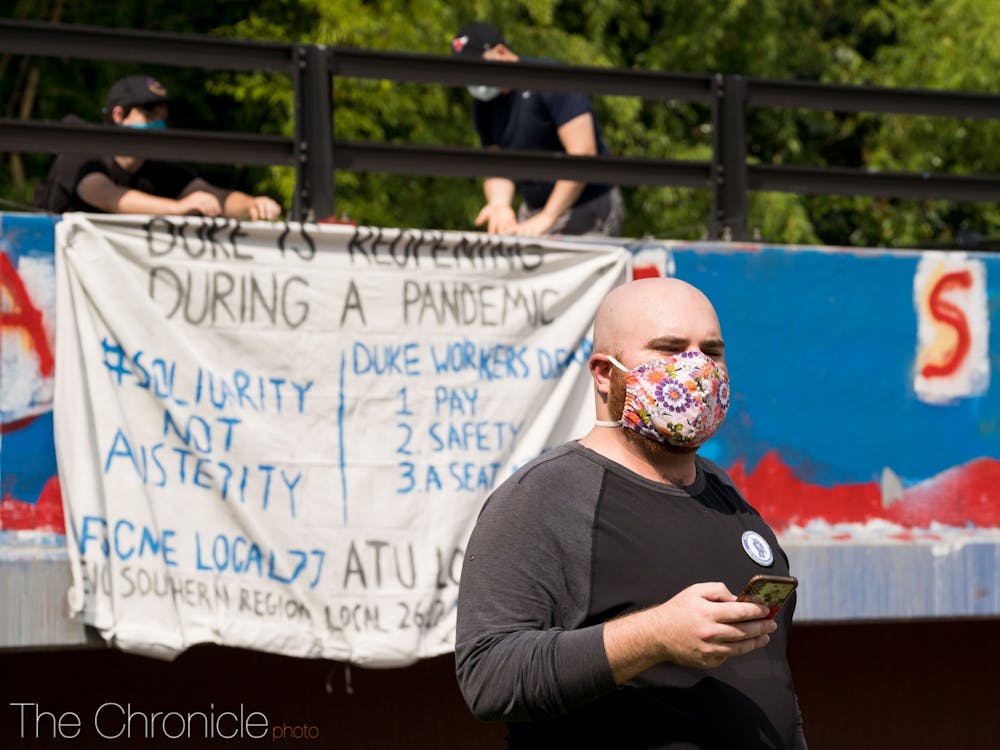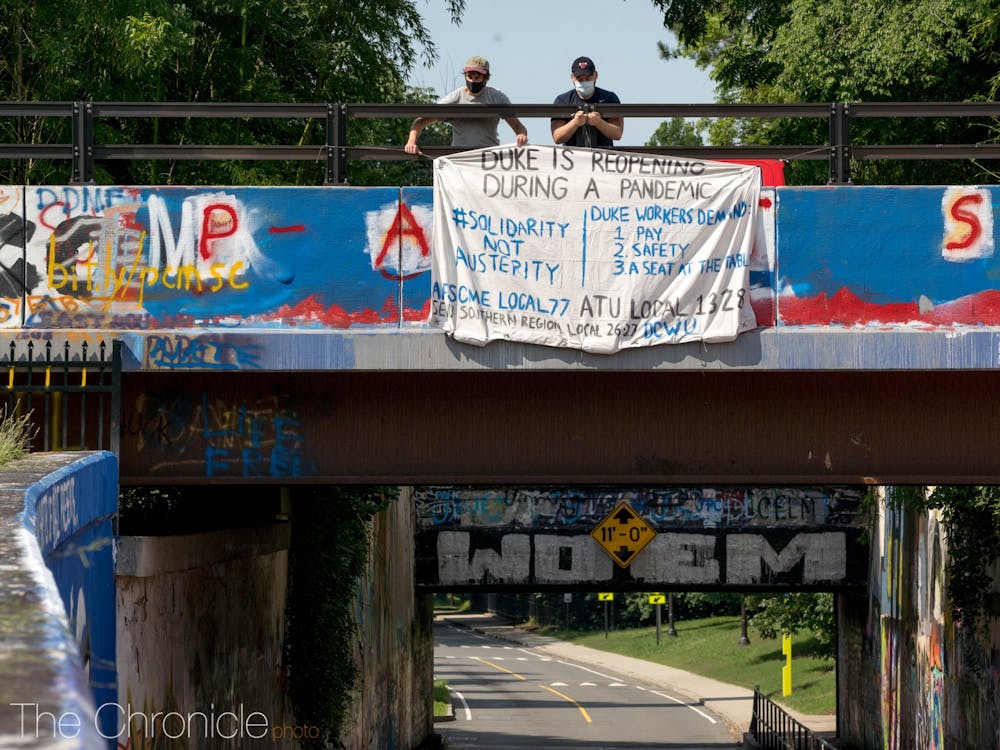Two men, both wearing protective masks, stood atop the East Campus bridge Monday morning and unfurled a banner announcing workers’ demands as the University prepares for students to return to campus in the Fall.
At the 10 a.m. event, members of Duke Workers United announced three-pronged demands for Duke’s administration: better pay, safety protections and more representation in the decision-making process.
The group’s representatives unfolded a white banner, letting it drop over the red “P-ARTS”—referencing the Project Arts pre-orientation program—that had been scrawled across the bridge. The top of the banner reminded viewers of the looming development faced by administrators, students and workers: “Duke is reopening during a pandemic.”
The representatives who unfurled the banner were members of the Duke Graduate Student Union, but Duke Workers United also represents the Duke Faculty Union, Duke Contract Workers United and other workers groups representing municipal employees and transit workers, according to a news release from the group.
The group includes bus drivers, dining workers, housekeepers and groundskeepers on campus, Griffin Riddler, co-secretary of DGSU and a second-year doctoral candidate in political science, told The Chronicle at the event.
“The Duke administration’s decision to reopen campus without consulting their workers is appalling,” said DGSU co-chair Chris Huebner, a fourth-year doctoral candidate in the English department, in the news release. “The people who do the work necessary to operate Duke’s classrooms, research labs, dining halls and facilities are going to be forced back to work with little concern for their health and safety.
Michael Schoenfeld, vice president for public affairs and government relations, wrote in an email to The Chronicle that “Duke is taking great care to prepare for fall semester, with the health and safety of our students and employees our highest priority, and with plans based, first and foremost, on the best available medical and public health research and guidance.”
He wrote that Duke is “now putting in place additional practices and procedures to ensure that the rest of our facilities are prepared for the return of students, faculty and staff.”
“We are regular contact with both managers and front-line workers about their experiences and concerns, and with representatives of our unions, and will continue to do so to address the many specific situations as they arise,” he continued.
Austin Wadle, the other co-chair of DGSU and a third-year doctoral student in civil and environmental engineering, announced the demands while a fellow representative livestreamed the speech.

Austin Wadle, co-chair of Duke Graduate Student Union, reads off a list of demands from Duke Workers United to an audience over Facebook Live.
The group’s first demand is safety, encompassing several requests: guaranteed personal protective equipment for all workers, a right to refuse unsafe work and report unsafe work conditions without retaliation, access to free coronavirus testing and access to a vaccine when available. The set of demands related to safety also asked Duke to refrain from deploying police to protests against police or racism.
“The … struggle for labor in this country has always been tied up in the struggle for racial justice,” Riddler told The Chronicle at the event. “We're not safe until everyone else is safe.”
Schoenfeld wrote in his email that Duke has “already implemented rigorous new hygiene and sanitation processes for the 20,000+ employees who have been working in our hospitals, clinics, labs, residence halls and other parts of campus safely and without interruption since the onset of the pandemic in March.”
He wrote that Duke provides all staff with “the necessary training and personal protective equipment,” as well as free on-site testing for staff experiencing symptoms.
Better pay is the group’s second demand, including guaranteed paid time off and paid sick leave.
Schoenfeld wrote in his email that “if a staff member tests positive, they are required to self-quarantine without that time being charged to their personal or sick leave.”
The demand for better pay also includes a 30-hour-per-week floor for all waged workers, back pay for all part-time contract workers who have been denied furlough pay during the pandemic and a one-year funding extension for all graduate workers to make up for research delays and work disruptions caused by the virus.
Get The Chronicle straight to your inbox
Sign up for our weekly newsletter. Cancel at any time.
Their third demand centers on having a “seat at the table.” They demand that Duke include representation of Duke Workers United on Team 2030, a long-term task force established by President Vincent Price to plan for the financial impacts of COVID-19. They also demand that the University not “reopen campus without explicit approval of its reopening plans by Duke Workers United,” the news release states.
“There are no cleaning staff, adjunct faculty bus drivers, food service staff, graduate workers or mechanics on President Price’s Team 2030,” Wadle said. “So it's no surprise that time and time again during this crisis, the university has failed to take our needs into account.”
Team 2030 includes Schoenfeld, Executive Vice President Tallman Trask, Chancellor for Health Affairs A. Eugene Washington, Academic Council Chair Kerry Haynie, the deans of the University’s 10 schools and Peter Feaver, professor of political science and public policy.
COVID-19 made its presence felt not only in the stated demands. Only five representatives attended, and each wore a mask and stood socially distanced from the others.
“During times of a global pandemic, you must be careful with every decision that we make, including how we advocate for ourselves,” Wadle said.
Riddler said that the various unions came together as a working group to create and sign the statement.
He said he’s concerned for his own safety as he returns to his office in Gross Hall. He worries about the possibility of air conditioning transmitting the virus as well as significant contact with undergraduate students.
At the most fundamental level, Riddler wants the University to hear the voices of its workers, he said. In the unity of this moment, he sees hope for the future.
“The fact that Duke workers are all workers—non-academic, academic, from food service workers, bus drivers to adjunct faculty and grad workers and everything in between—that we're all coming together to make our voices heard, it's not a new thing,” he said. “But it shows that the labor movement, both here at Duke and nationwide, is roaring back to life.”
Matthew Griffin contributed reporting.

Chris Kuo is a Trinity senior and a staff reporter for The Chronicle's 118th volume. He was previously enterprise editor for Volume 117.

